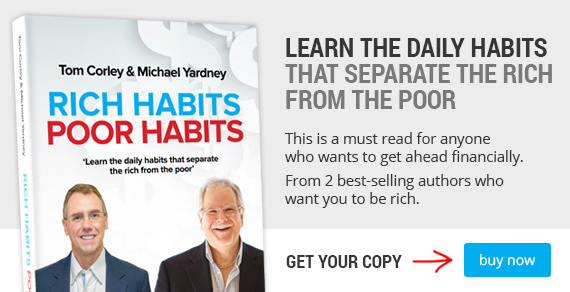One of the big separators between the rich and the non-rich is the rich have developed the Rich Habit of taking action.
Action is really two things:
-
- Thinking Action
- Physical Action
Thinking Action
We all think.
According to Psychology Today, the average person has 50,000 thoughts a day.
According to my research, the Thinking Actions of the rich are very different from the poor:
- The Rich Are Positive Thinkers – 67% of the self-made millionaires in my study forged the habit of being positive and upbeat. A positive, mental outlook is critical to overcoming problems, obstacles, pitfalls, mistakes and failures. Staying positive is a critical component to becoming wealthy. Positivity is like a radar in search of solutions to intractable problems. Thus, positive thinkers are able to see opportunities, where others see only negative consequences.

- The Poor Are Negative Thinkers – 70% of the thoughts of the average person are negative (Psychology Today). Negative thinkers are unable to see solutions to problems. Thus, they are unable to overcome obstacles, pitfalls, their mistakes and their failures. Opportunities pass them by because they are not looking for opportunities. They are too focused on the negative consequences.
- The Rich Are Decision-Makers – 91% of the rich in my study were decision-makers. Forging the habit of making decisions is critical to success. Those who develop the habit of making decisions are sought after as leaders, by others. Decision-makers have forged the habit of overcoming the fear of making decisions along with the paralysis of analysis associated with those unable to make decisions. The rich do not over think, which is a form of procrastination. It is impossible to know everything you need to know before making a decision. The rich forge the habit of being comfortable being uncomfortable about making decisions.
- The Poor Let Others Make Decisions – 98% of the poor in my study were not decision-makers. They succumb to the fear of making a decision. They get lost in analysis and over thinking, which is a form of procrastination. The poor feel uncomfortable about making decisions, so they defer to others.










